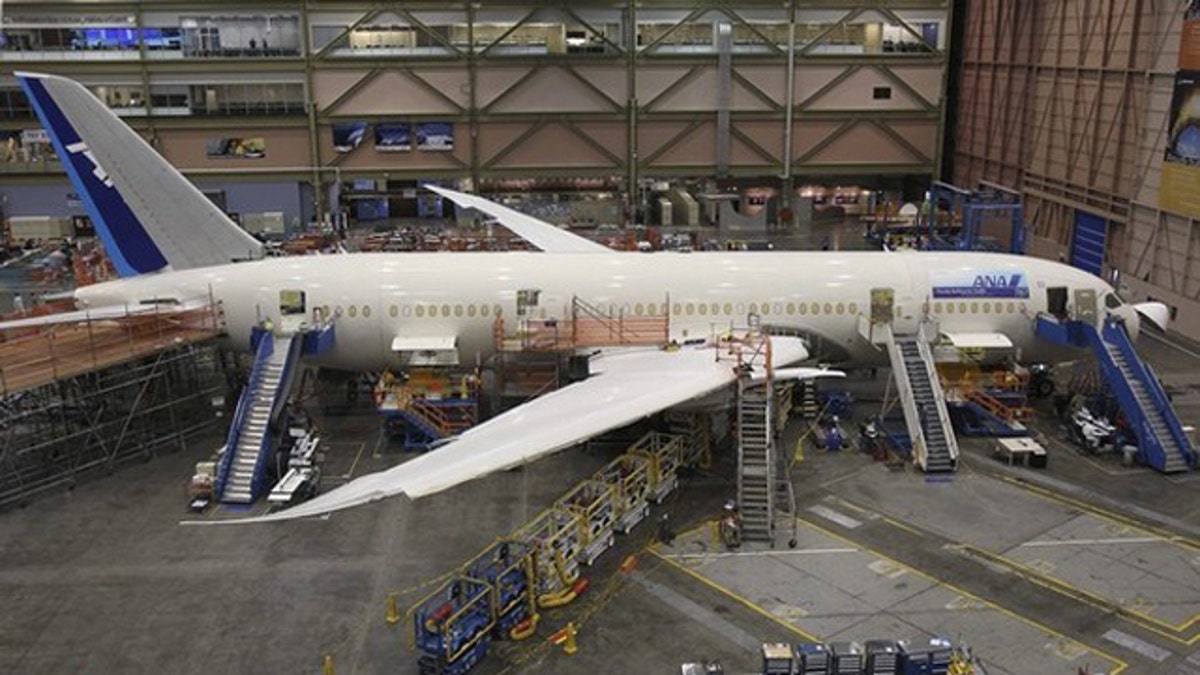
A Boeing 787 Dreamliner is seen on the production line at Boeing's Commercial Airplane manufacturing facility in Everett, Wash. (AP)
The former chairman of the National Labor Relations Board told FoxNews.com that a board attorney's bid to stop Boeing from opening a production line at a non-union site in South Carolina is "unprecedented" and could have serious implications for companies looking to expand.
The comments Tuesday from Peter Schaumber add to the roiling debate over the complaint filed last week against the aerospace giant. NLRB's acting general counsel, taking up allegations from union workers at a Puget Sound plant in Washington state, had accused Boeing of violating federal labor law by moving to open a second 787 Dreamliner airplane production line in South Carolina.
The complaint hinged on claims that Boeing made "coercive statements" regarding union-led strikes, and then retaliated by transferring its second line to a non-union facility. As evidence, the NLRB noted that a Boeing executive said in an interview that the overriding factor in going to South Carolina -- a right-to-work state where unions cannot force employees to join -- was a desire to avoid disruptions. The union in Washington state has led several strikes against Boeing since the 1970s, most recently in 2005 and 2008.
But Schaumber said the complaint is a big stretch and would mark a departure. He said that if the claim is upheld, it could jeopardize any company with unionized workers that wants to expand to a right-to-work state.
"It would be fair to say it's unprecedented," he said.
Schaumber, a Bush administration appointee who served on the board for almost eight years including as chairman, argued that the NLRB counsel offered "no basis" for the central claim that Boeing retaliated by transferring work from Washington to South Carolina.
"The workers don't have any claim to the work," he said. "If the workers don't have any claim to the work, it wasn't retaliatory to open a new second production line. ... It is simply expanding its business operation."
Boeing offered a similar defense, saying the jobs in South Carolina will not come at the expense of jobs in Washington state. The new production line is expected to pump out three planes a month, on top of the seven planes a month coming out of the Puget Sound area. Boeing said since the expansion decision was made, union employment in Puget Sound has increased by about 2,000 workers. Plus Boeing noted that the South Carolina factory is almost done and has involved more than 1,000 workers in the process.
"This claim is legally frivolous and represents a radical departure from both NLRB and Supreme Court precedent," Boeing General Counsel J. Michael Luttig said in a statement.
South Carolina Republican lawmakers were similarly outraged over the complaint. Sen. Jim DeMint called it a "political favor" for the unions who supported President Obama's 2008 campaign.
Sen. Lindsey Graham vowed to try to cut off funding for the "wild goose chase."
"If successful, the NLRB complaint would allow unions to hold a virtual 'veto' over business decisions," he said in a statement.
FoxNews.com is seeking comment from Washington state's two Democratic U.S. senators.
But NLRB spokeswoman Nancy Cleeland said the charge that Boeing is transferring work away from union employees stems from the company's original commitment "to the state of Washington that it would build the Dreamliner airplanes in that state." Plus she said the South Carolina facility would assume work that is currently being done at a Seattle facility. "As far as the merits of the complaint go, however, the distinction does not matter. Whether this work is considered new or existing, the decision about where to locate it would violate federal labor law if done for discriminatory reasons," she said in an email to FoxNews.com.
NLRB General Counsel Lafe Solomon cited Boeing executives' comments on their desire to avoid strikes in claiming the company violated federal rules.
"A worker's right to strike is a fundamental right guaranteed by the National Labor Relations Act," Solomon said in a statement. "We also recognize the rights of employers to make business decisions based on their economic interests, but they must do so within the law."
Solomon noted that a settlement could still be reached. Plus the NLRB stressed that the complaint doesn't request that Boeing shut down the South Carolina plant; however, it seeks to keep 787 production in Washington.
The International Association of Machinists and Aerospace Workers, which initially filed the allegation against Boeing with the NLRB in March of last year, said in a statement that the South Carolina decision was aimed at the union.
"Boeing's decision to build a 787 assembly line in South Carolina sent a message that Boeing workers would suffer financial harm for exercising their collective bargaining rights," Vice President Rich Michalski said. "Federal labor law is clear: it's illegal to threaten or penalize workers who engage in concerted activity, and it's illegal in all 50 states."
A hearing in the case is now scheduled before an administrative law judge on June 14 in Seattle.
That decision could then be voted on by the National Labor Relations Board itself. And that decision could in turn be appealed to a federal circuit court.
Schaumber said the dispute could drag on for a while, but suggested the current makeup of the board does not favor Boeing.
"This board views its role as to promote unionization, and with that in mind, that will be their focus in deciding this case," he said.




















